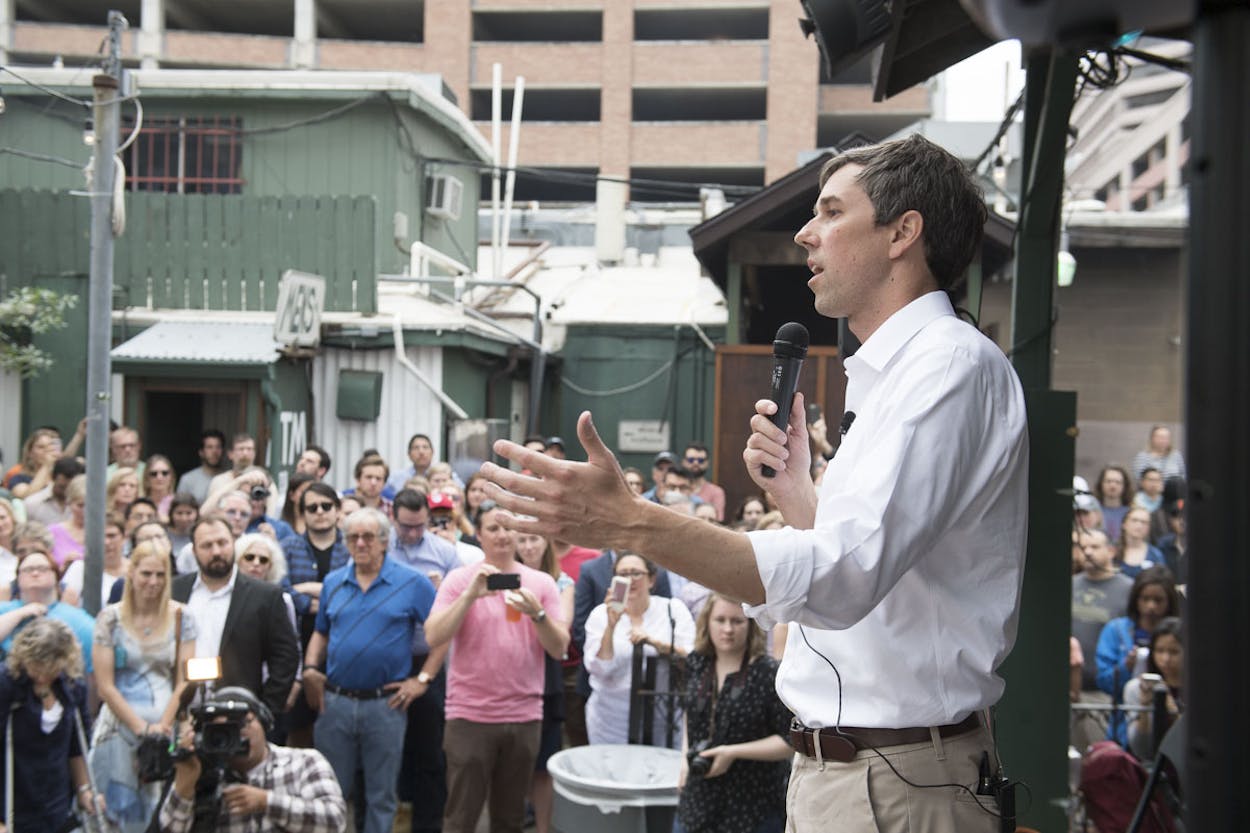Two years ago, it took a tough legislative fight to pass a medical marijuana bill that allowed for the use of cannabis oil to fight epilepsy. But attitudes toward marijuana seem to be shifting. Harris County started a new diversion program to essentially decriminalize marijuana, and an University of Texas/Texas Tribune poll released in February found that public opinion on the subject has changed dramatically in the past year. In 2015, only 32 percent of those surveyed said marijuana should be legal; this year, 53 percent said it should be legal for most uses.
Now, Texas has what would have been unthinkable just a few years ago: a statewide candidate for U.S. Senate who wants to reform federal law to end the prohibition on marijuana and regulate its sale like alcohol. Beto O’Rourke has pushed this ever since he served on the El Paso city council during a time when the sister city of Juárez was known as the murder capital of the world. Along with fellow council member Susie Byrd, O’Rourke wrote Dealing Death and Drugs, a book arguing for the legalization of marijuana to undermine the finances of the drug cartels.
O’Rourke, who has been representing El Paso in Congress since 2013, is seeking the Democratic nomination for U.S. Senate, hoping to challenge the re-election of incumbent Senator Ted Cruz. U.S. Representative Joaquin Castro of San Antonio is also eyeing the Democratic nomination, while former political consultant Matthew Down is mulling an independent run. It wasn’t that long ago when O’Rourke’s stand on marijuana would have made his candidacy a non-starter. Not any more.
“The people in Texas are way ahead of their elected representatives on this and so many other issues,” O’Rourke told me in an interview. “Texas is a state that is pretty jealous of its independence. They don’t want big government, don’t want government in their lives.”
The War on Drugs, launched by the Nixon administration, has been a “tragic failure” according to O’Rourke. “Forty years in, marijuana is just as available today in the average Texas community as it was in the 1970s,” he said. Marijuana has grown more potent and now is sold in middle schools as well as high schools. Unlike marijuana, tobacco is legal despite the science that shows it kills people over time, but O’Rourke said by treating it as a public health issue the United States has been able to reduce tobacco consumption.
“Ending the prohibition on marijuana, and not making it a state by state issue…federally ending the prohibition on marijuana is going to save lives, saves billions of dollars, and moves us from a country that imprisons more of its citizens than any country on the face of the planet,” O’Rourke said.
I asked O’Rourke could this idea be sold as a campaign issue. “When I go town to town or door to door, they’re already there. I don’t have to sell it,” he said.
One voter who is not buying it is A.J. “Andy” Louderback, sheriff of Jackson County and the legislative director of the Texas Sheriff’s Association. “Do we really need another source for Texans to get high?” he asked. Louderback said it “has been a popular case for years” to claim legalized marijuana would undermine the drug cartels financially, but he said they have more lucrative sources of income. He said the legal drug trade in Colorado led to the creation of strains of marijuana with increased potency and turned some Colorado growers into exporters to the rest of the United States. “Advocates want to promote increased drug use in the U.S.,” Louderback said.
There are several bills before the current Legislature to either decriminalize or legalize marijuana. State Representative Donna Howard, a Democrat from Austin, filed HJR 46, a proposed state constitutional amendment to legalize cannabis that would go directly to the voters without passing review by the governor. It would, however, also would require a two-thirds affirmative vote in both chambers to get set for an election.
“Though I believe the Texas Legislature is not ready to pass full legalization, I suspect that the citizens of Texas might be more open to the possibility,” Howard said. “I certainly think they are ready to have the conversation, and that’s why I filed HJR 46. Many recognize the benefits of decriminalization and medicinal uses, and we’re also now seeing the huge revenue potential as other states pass legislation legalizing and regulating the cannabis industry.”
One politician pulling for O’Rourke, at least on this one issue, is former state Representative David Simpson of Longview. Last May, Simpson—who believed marijuana should be legalized because it is a plant created by God—lost the Republican primary for state Senate. Simpson’s opponent hammered him over his stand for legalized marijuana, which also played a role in law enforcement turning its back on Simpson. When I asked Simpson if a politician today can win on the issue, he replied, “I certainly hope so.” But after we talked for a bit, Simpson added, “I don’t know that we’re quite at the tipping point yet.”






